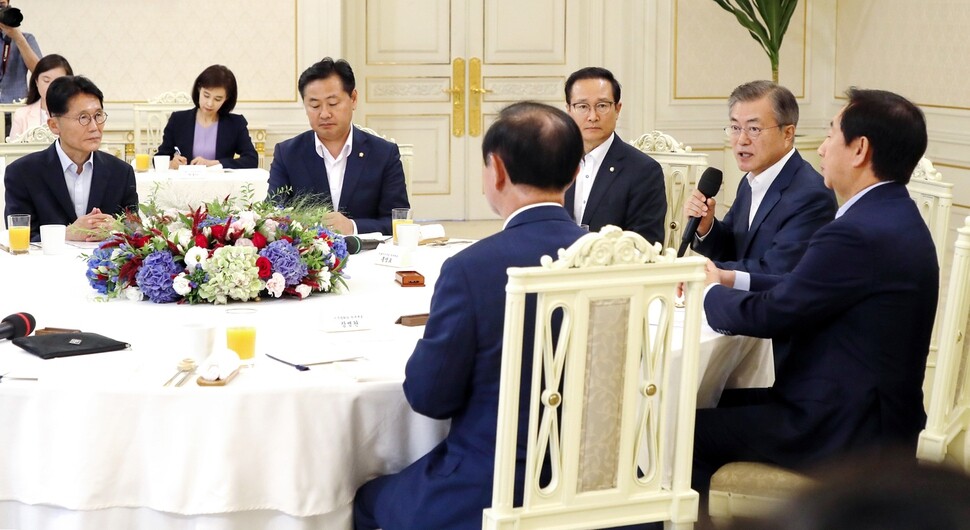hankyoreh
Links to other country sites 다른 나라 사이트 링크
Moon asks National Assembly to ratify Panmunjeom Declaration

On Aug. 16, South Korean President Moon Jae-in asked the floor leaders of both the ruling and opposition parties in the National Assembly to ratify the Panmunjeom Declaration as part of his plan to create institutional safeguards to protect inter-Korean agreements from being scrapped whenever power changes hands.
“An inter-Korean summit will be held in Pyongyang next month, and if the National Assembly ratifies the Panmunjeom Declaration that was made on Apr. 27, I think it will be very helpful during the Pyongyang summit,” Moon said during a luncheon with the leaders of the ruling and opposition parties.
“If you ratify the Panmunjom Declaration before my summit in Pyongyang, I think it will also help me push for a meeting between the South and North Korean legislatures.”
On Apr. 30, three days after the inter-Korean summit, Moon had said, “I urge you to quickly follow the procedure laid out in the Development of Inter-Korean Relations Act for adopting, ratifying and promulgating inter-Korean agreements. Please bear in mind that this is a legal, and not a political, procedure.”
Moon explained the reasons why the National Assembly’s ratification is necessary during a meeting of the inter-Korean summit preparatory committee on Mar. 21: “That’s the only way that the terms of the agreement will continue to be promoted despite changes in the political situation. The National Assembly’s ratification is absolutely necessary since implementing the terms of the inter-Korean summit agreement requires the allocation of government funds.” This reflects Moon’s desire to create a sturdy mechanism to prevent backsliding on the implementation of inter-Korean agreements.
Since Moon had chaired the preparatory committee for the 2007 inter-Korean summit while serving as the Blue House chief of staff, he was best positioned to watch how inter-Koran agreements are made, and he also witnessed the agreement going up in smoke under the next administration, under ex-president Lee Myung-bak.
How changes in power of dissolved inter-Korean agreements in the past
The Oct. 4. Joint Declaration made by former president Roh Moo-hyun and North Korean leader Kim Jong-il defied predictions. Expectations had been low since the summit took place toward the end of Roh’s presidency, but he still produced a concrete agreement containing eight points. Roh even bragged that “it turned out so well that I couldn’t fit everything into the suitcase I’d brought.”
The two leaders agreed to arrange a three- or four-party summit during which the Korean War could be formally ended, to establish a “West Sea peace and cooperation zone” including Haeju, North Korea, and the waters around it, to initiate the second phase of development at the Kaesong Industrial Complex, to arrange tours to Mt. Baekdu, to initiate direct flights from Seoul to Mt. Baekdu for those tours and to send an inter-Korean team of fans to the 2008 Beijing Olympics on a train on the Gyeongui Line.
But these agreements came to nothing because of conflict between North Korea and the US over denuclearization and the Lee Myung-bak administration’s arrival the next year.
In his book “The Two Koreas,” former Korean Peninsula expert Don Oberdorfer wrote that the policy makers at the beginning of the Lee administration were diehard anticommunists who believed there were still forces in South Korea who were under North Korea’s thumb and that the Communists were exerting a deleterious influence on labor, culture and the arts. The Lee administration rewound some aspects of North Korean policy to the way they had been under former president Chun Doo-hwan, some 25 years earlier, Oberdorfer said.
By Seong Yeon-cheol, staff reporter
Please direct comments or questions to [english@hani.co.kr]

Editorial・opinion
![[Guest essay] The real reason Korea’s new right wants to dub Rhee a founding father [Guest essay] The real reason Korea’s new right wants to dub Rhee a founding father](https://flexible.img.hani.co.kr/flexible/normal/500/300/imgdb/original/2024/0423/8317138574257878.jpg) [Guest essay] The real reason Korea’s new right wants to dub Rhee a founding father
[Guest essay] The real reason Korea’s new right wants to dub Rhee a founding father![[Column] ‘Choson’: Is it time we start referring to N. Korea in its own terms? [Column] ‘Choson’: Is it time we start referring to N. Korea in its own terms?](https://flexible.img.hani.co.kr/flexible/normal/500/300/imgdb/original/2024/0423/3617138579390322.jpg) [Column] ‘Choson’: Is it time we start referring to N. Korea in its own terms?
[Column] ‘Choson’: Is it time we start referring to N. Korea in its own terms?- [Editorial] Japan’s rewriting of history with Korea has gone too far
- [Column] The president’s questionable capacity for dialogue
- [Column] Are chaebol firms just pizza pies for families to divvy up as they please?
- [Column] Has Korea, too, crossed the Rubicon on China?
- [Correspondent’s column] In Japan’s alliance with US, echoes of its past alliances with UK
- [Editorial] Does Yoon think the Korean public is wrong?
- [Editorial] As it bolsters its alliance with US, Japan must be accountable for past
- [Guest essay] Amending the Constitution is Yoon’s key to leaving office in public’s good graces
Most viewed articles
- 1[Guest essay] The real reason Korea’s new right wants to dub Rhee a founding father
- 2Why Korea shouldn’t welcome Japan’s newly beefed up defense cooperation with US
- 3Terry Anderson, AP reporter who informed world of massacre in Gwangju, dies at 76
- 4[Column] ‘Choson’: Is it time we start referring to N. Korea in its own terms?
- 5[Column] The clock is ticking for Korea’s first lady
- 6Opposition calls Yoon’s chief of staff appointment a ‘slap in the face’
- 7Senior doctors cut hours, prepare to resign as government refuses to scrap medical reform plan
- 8New AI-based translation tools make their way into everyday life in Korea
- 9[Editorial] Japan’s rewriting of history with Korea has gone too far
- 10[Column] Are chaebol firms just pizza pies for families to divvy up as they please?